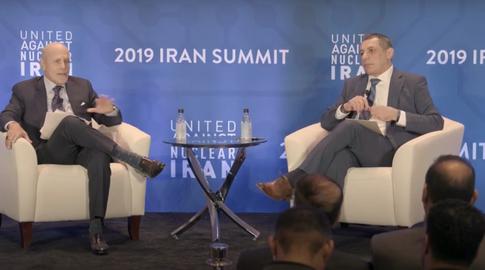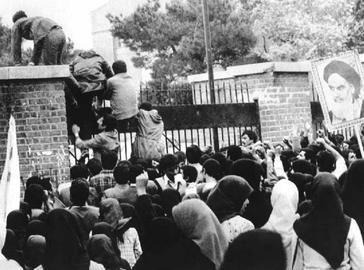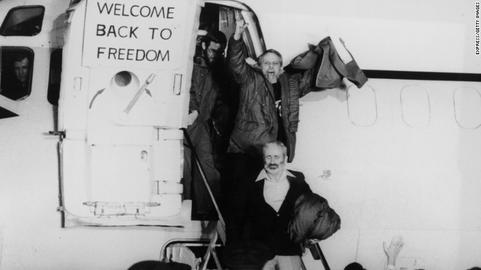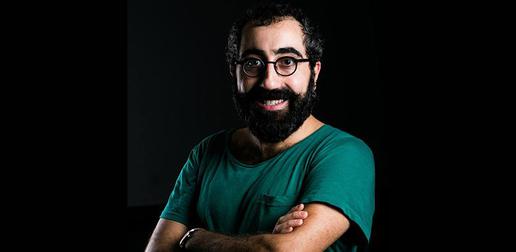Barry Rosen, a survivor of the 1979-81 US embassy hostage crisis, says the concept of “guest” has atrophied in Iran because of the regime’s brutality.
Mr Rosen, who first went to Iran as a Peace Corps volunteer in 1967, was a year into his new job as press attaché for the US embassy in Tehran when revolutionaries of the new Islamic Republic stormed the building and captured the 52 Americans inside.
The overrunning of the embassy on November 4 by pro-Ayatollah Khomenei students marked the start of a 444-day ordeal that would have a cataclysmic impact on US-Iran relations for decades to come, but also of a policy of egregious hostage-taking by and on behalf of the Iranian regime that continues to this day.
IranWire’s new documentary, The Treacherous Host, has shone a light on a recent case of the same in which Nizar Zakka, a Lebanese national, was unjustly detained in the country for four years prior to his release in August 2019.
Just like the American captives of 1979 and countless others down the decades, Zakka was tortured and abused, held in solitary confinement for weeks on end, blocked from contacting his loved ones and subject to repeated attempts to force him to admit to an invented “guilt”.
Barrry Rosen is now a prominent advocate for hostages worldwide and an advisory board member for United Against Nuclear Iran. “Nizar and I have had several conversations about his captivity,” he told IranWire, “but this video is amazingly profound in many ways.
“First, Nizar was and is totally innocent, perhaps more so because he knew nothing about the political machinations of the Guards and the Revolutionary Courts, and perhaps naively thought the Iranian "government" was like any other, which usually is empowered to act when something absurd happens to any Iranian, let alone a "guest." To be honest, no one is a mehman (guest) in Iran. That tradition has been destroyed by the regime.”
Dual nationals and foreign visitors have repeatedly been held as bargaining chips or for political purposes by the Iranian regime, under the thin guise of national security. In response to IranWire's new film, Richard Ratcliffe, husband of the imprisoned British-Iranian national Nazanin Zaghari-Ratcliffe, has called for an end to international “inertia” in the face of criminal hostage-taking by Iran.
But Mr. Rosen warned that the worst of Iran’s brutality is often spared for its own citizens. In recent months, scores of Iranians have been arrested, tortured, framed as conspirers against the regime and even sentenced to death merely for having attended the November 2019 protests.
“While there are many dual-nationals and other foreigners who are used either for hostage exchange reasons or just plain ‘paranoia’, the vast number of prisoners in Iran are Iranian ‘political’ [prisoners] or human rights advocates like Nasrin Setoudeh,” Mr. Rosen said.
“The regime is run, I believe, more by the Guards than even Khamenei, and both of them have no grand strategy except to keep themselves in power, and will do anything to remain in power. This goes for its foreign policy too.
“They know they have nowhere to go if there is a social revolution and they will fight to the bitter end to keep themselves afloat. If there is ever a real revolution from top to bottom once again, this time the regime will make the Shah look like a mere nothing when it comes to blood-letting.”
More than 40 years on from the post-Iranian Revolution hostage crisis, Mr Rosen and those other victims who are still alive are still waiting to be compensated by the US government. They have received, he says, less than 20 per cent of what was promised to them since legislation was passed in 2015.
“We are trapped in an American bureaucracy that has thousands of individuals who have sued Iran, for cause or not, that have clogged the system,” he said. “We are both the oldest group that deserves to be compensated and the oldest has never to be never fully compensated.”
Related coverage:
The Treacherous Host: An IranWire Film
Nobel Laureate: It Takes Moral Courage to Speak Out
Jailed Briton's Daughter: If You're Real Muslims, How Can You Sleep at Night?
Persecuted Lawyer: Nizar Zakka Had a Happy Ending, But We Did Not
Nazanin's Husband: Hostage-Taking by Iran Must End
Campaigners for Jailed Scientist: These Things Need to be Shown
visit the accountability section
In this section of Iran Wire, you can contact the officials and launch your campaign for various problems




























comments